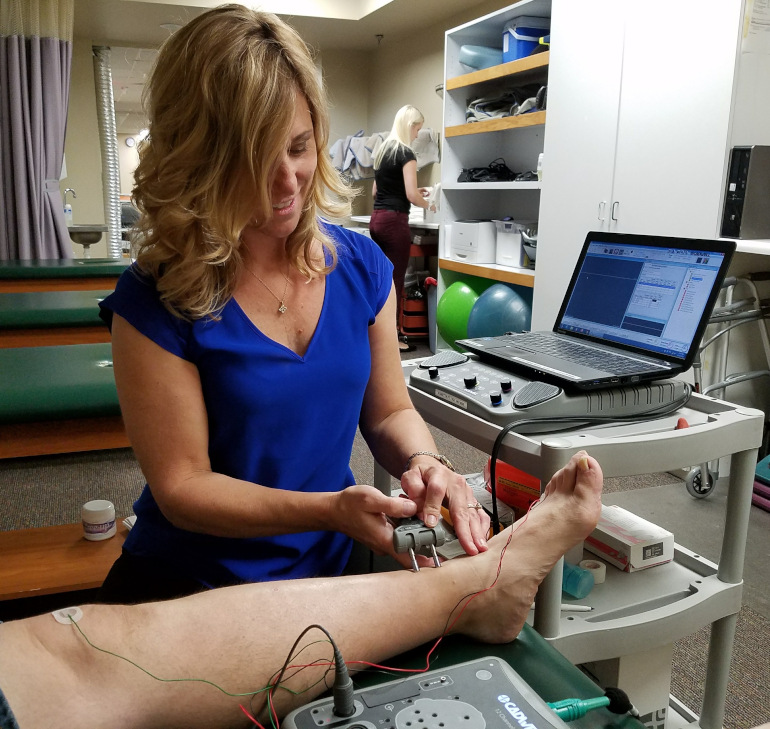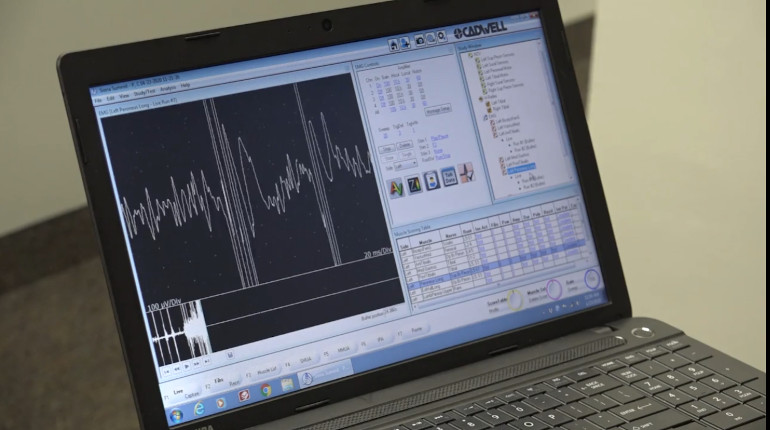Electromyography (EMG) and (NCS)
Find the Root Cause of Physical Pain with Electromyography (EMG) and Nerve Conduction Studies (NCS)
Treatments that address symptoms rather than the root cause are a waste of time and money. Even worse, by failing to address the root cause of a physical problem, the individual continues to suffer from pain unnecessarily.
Electromyography (EMG) and Nerve Conduction Studies (NCS) are tests that allow medical teams to conduct the detective work needed to find the cause of a variety of types of physical pain. The types of pains the EMG and NCS apply to include:
- Back Pain
- Neck Pain
- Shoulder Pain
- Knee and Elbow Pain
- Muscle Weakness
- Burning Sensation
- Numbness or Tingling

What is an EMG test ? How does it work ?
An Electromyography (EMG) measures muscle response or electrical activity in response to a nerve’s stimulation of the muscle. The test is used to help detect neuromuscular abnormalities. During the test, one or more small needles (also called electrodes) are inserted through the skin into the muscle.
It is commonly performed by a physiatrist, neurologist or physical therapist with special training for this procedure. An EMG nerve test can provide your doctor with specific information about the extent of nerve and/or muscle injury and can pinpoint the exact location of the injury and give some indication of whether or not the damage is reversible.
What is a Nerve Conduction Study (NCS) ? How does it work ?
An Nerve Conduction Studymeasures how fast an electrical impulse moves through your nerve which helps identify nerve damage.
The test is administered by placing two electrodes on the skin over your nerve. One stimulates the nerve with a mild electrical impulse. The other electrode records the activity. This test may be repeated as needed for each nerve being tested.
The speed the impulse moves through your nerve is then calculated by measuring the distance between electrodes and the time it takes for electrical impulses to travel between electrodes.
NCS is often used along with an EMG to help differentiate between a nerve disorder and a muscle disorder. NCS detects a problem with the nerve, while an EMG detects whether the muscle is working properly in response to the nerve’s activity.
In most cases, your doctor will perform both, but in some situations, only one or the other may be done.
What can EMG/NCS be used to diagnose?
There are a number of conditions that the EMF/NCS will help identify including:
- Carpal tunnel syndrome
- Pinched nerve
- Lumbar radiculopathy
- Cervical radiculopathy
- Sciatica
- Neuropathies
- Muscle diseases
- Muscular dystrophy
- ALS (formerly known as Lou Gehrig’s disease)
- Myasthenia gravis
Why does my doctor want me to take these types of tests?
Your doctor may order EMG/NCS tests if you experience any of the following symptoms:
- Numbness
- Decreased sensation
- Tingling or frequent feeling of “pins and needles”
- Radiating pain or burning sensation
- Muscle spasms or weakness
- Difficulty performing daily tasks such as walking, buttoning clothes or handling objects

How long does EMG / NCS testing take ?
Testing usually takes anywhere from 30 to 90 minutes, depending on the condition being tested and the findings of the study. A report that includes the results and an interpretation will be sent to your doctor.
Are NCS / EMG tests painful ?
EMG/NCS testing may result in some discomfort, but it is usually well-tolerated without any need for pain medication.
What should you know before taking these EMG/NCS ?
Testing is extremely safe but talk with your doctor if you take blood thinners, have a pacemaker or implanted defibrillator before having the test. No special preparation is needed for people who have hip, knee or other joint replacement prostheses.
Unlike preparing for dental procedures or certain types of surgeries by taking antibiotics, no special preparation is necessary for those patients who have a joint replacement or other artificial implants in their body.
You should take any medications you normally take on the day of the test.
What are the side effects of testing ?
Side effects of an EMG/NCS testing may include some muscle soreness, but this rarely lasts more than an hour or two after the exam.
EMG/NCS at Panetta Physical Therapy
Therapists at Panetta Physical Therapy have been providing EMG/NCS testing in Long Island for 7 years. With offices located in Bay Shore, NY, Ronkonkoma NY, and Roslyn, NY, we are conveniently located for clientele all over Long Island and New York City.
